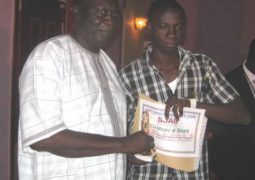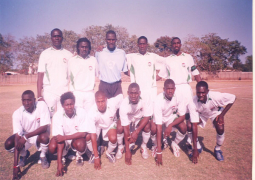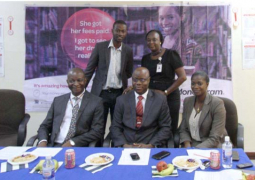Respected commissioners & colleagues, I bring greetings from our Chancellor, Sheikh, Professor, Dr Yahya A.J.J Jammeh and the University of The Gambia community.
I am honoured to have been asked to give a statement at the conclusion of the Forum on the Participation of NGO’s in the 49th Ordinary Session of the African Commission on Human and Peoples’ Rights, and I would to thank the African Centre for Democracy and Human Rights Studies for inviting me.
This has been a lively and thought provoking Forum. Set against a backdrop of recent events in Libya, Egypt, Tunisia and Ivory Coast, delegates discussed the importance of protecting human rights defenders in Africa.
A wide variety of important themes were discussed, including the prevention of torture, rights of women and the rights of the disabled.
I personally found the discussion on the rights of indigenous peoples and access to health and water as one of the most important topics discussed.
As expected in a forum such as this one, some themes were more controversial than others. The session on the Role of Religion in Politics and Elections provoked a fascinating debate. I am happy to hear that the Forum has formulated several key recommendations, including greater protection for human rights defenders in Africa, and a greater role for disabled people in the human rights environment.
As I reflect on the deliberations, the importance of responsible leadership in all strata in our countries and our individual and collective resolve to go beyond the usual rhetoric and confrontations are required in abundance measure to implement some of the recommendations. My reflections and thoughts are best encapsulated in a statement by a great and rare gem and Africa’s iconic statesman- President Nelson Mandela. I quote...
"Our single most important challenge is therefore to help establish a social order in which the freedom of the individual will truly mean the freedom of the individual. We must construct that people-centred society of freedom in such a manner that it guarantees the political liberties and the human rights of all our citizens."
Nelson Mandela, speech at the opening of the South African parliament, Cape Town 25 May 1994.
The African Centre has long been one of the most important human rights institutions in Africa. It plays a central role in the promotion and protection of human rights and democratic principles in Africa through capacity building, networking, action-oriented research, publications and documentations.
Given the Centre’s registered successes, its role and work is just as relevant today.
This has been a difficult year in Africa, and mindful of recent events in North Africa, the protection of human rights on our continent remains vitally important.
The object of this Forum is to allow NGOs to share ideas and discuss common issues concerning human rights promotion and protection in their respective countries.
We hope that the topics discussed during this session will enable the NGOs to give a better voice to human rights issues in their own nations whilst they participate in the 49th Ordinary Session of the African Commission on Human and People's Rights. The Centre is one of the best know established institutions in the field of human rights promotion and participation in Africa.
Globally, people are struggling human dignity. Policy makers in most of Africa entrusted with our economies tend to focus largely on national economic growth.
However, their people are striving for something different: meaningful lives, decent jobs and a dignified existence.
An increased GDP has not always made a difference to the quality of people's lives and or reduce poverty, and reports of national prosperity are not likely to console those whose existence is marked by inequality and deprivation. As the late Mahbub ul Haq, the Pakistani economist who inaugurated the Human development reports of the UNDP suggest in the 1st report in 1990: "The real wealth of a nation is its people. And the purpose of development is to create an enabling environment for people to enjoy long, healthy, and creative lives.
This simple but powerful truth is too often forgotten in the pursuit of material and financial wealth." He suggests a new theoretical approach to development, if it is to respond to people’s most urgent problems.
It is important to note, poverty and ignorance and lack of access to reliable information and education and unemployment of youths across Africa is at the core of the triggers of human rights violation. All efforts most be done by our countries to reduce and ultimately eliminate food insecurity in Africa, and enhance access to education and the digital and knowledge economy.
All Africans deserve 'social dignity'. Without which, values are eroded and chaos increasingly looms in our societies. We urgently need to return and respect our African cultural values that has always respected and protected Human rights of individuals and communities.
Further, Education is such a crucial avenue of opportunity.
Access to quality Primary, Secondary and University Education and access to the digital world via adequate and affordable bandwidth - a key to the information and knowledge economy and competitiveness, Food sufficiency and health care must and should be an enforceable fundamental human right. All leaders of Africa must not only commit to these but also ensure its sustainability!
The Gambia has been fortunate to have a leader- His Excellency, President Sheikh Professor, Dr Yahya A.J.J Jammeh, who had the foresight, to establish expansive access to quality education at all levels across the country. He early on realized the only sustainability and guarantee of Human Rights is through Education, Agriculture, Health and a well-informed citizenry.
The University of The Gambia, through the Law Faculty, is one of the newest institutions, which supports and promotes human rights.
We have already started contributing to the field. And we are on course to establish a similarly excellent reputation for teaching and doing research in the field of human rights.
The Faculty of Law of the University of The Gambia is in its fourth year, and later this year the first group of Gambian-trained lawyers will graduate. This represents a major step forward for the administration of Justice in The Gambia.
Until now, all lawyers practicing in our country had been trained overseas. Non-Gambians provide a great deal of the expertise in our legal system. Now, for the first time, there will be cadre of home-trained Gambian lawyers, able to sit in the courts, provide legal advice to their fellow countrymen, and train the future generations of lawyers. We hope this will usher in an unprecedented era in Justice delivery by Gambians for Gambians.
Human rights law takes centre stage in the Law Faculty's LLB Programme. Students this year are taking no fewer than three human rights classes. International human rights law, and African human rights law are both mandatory courses for upper year students. And this year a new class, Current issues in human rights, is being taught, which looks at constitutional law in an age of terror and examines the balance between human rights and national security.
In addition, students are taught International Humanitarian Law, whilst first year students are taught the basic values of human rights and the rule of law in their Constitutional Law class.
Although young, the faculty of Law is making our presence felt in the world of student international human rights law mooting competitions.
Last year, we were proud to send the first ever Gambian team to participate in the African Human Rights Moot Court Competition in Benin. This was possible due to the generosity of the Human Rights Centre of the Faculty Law of The University of Pretoria in South Africa.
Just last month we sent a team to the International Criminal Court trial competition in The Hague, and won an award as the best African team. Fresh from that success we will be sending another team to the African Human Rights Moot Court Competition, which will be held this year in Pretoria. Once again thanks to the sincere support of our South African Partners.
Some colleagues from the Institute for Human and Development in Africa and the Commission have been good enough to give up their time to help coach our young competitors and I would like to take the opportunity to thank them. We are expecting a better success from our team when they go to Pretoria this year. And we hope for more opportunities to work with the Institute and the Commission to share their expertise with our young students. We look forward to establishing the same level of cooperation and partnership with the African Canter as well.
The lecturers and instructors tell me our students are inquisitive and always put forth questions on human rights issues. Our students understand the theory of human rights law, but perhaps more importantly, they can understand the importance of the application of human rights law in the real world as they continue to participate in practical sessions on campus and beyond.
The students and the professors all appreciate the significance of learning human rights law in Banjul, home of the African Commission. Being in Banjul gives our students unique opportunities to learn more about human rights.
This is illustrated by rare opportunities like this NGO Forum, the Sessions of the African Commission and when the International Criminal Tribunal for Rwanda held one of its annual international conferences here in Banjul some time last year and during which it organised a public panel discussion at UTG's Faculty of Law.
The Law Faculty is striving to produce a generation of young Gambian lawyers who will be the future of the Gambian legal system. The Faculty of Law will continue to support all efforts to promote human rights through teaching, objective research, publication, advocacy and service. Some of the services we will launch during Fall 2011 at the UTG is a legal Aid clinic to be staff by our students and faculty. This is supported through a modest grant from UNDP. We are very much appreciative of their continuing generous support to the UTG.
Further, the UTG will be starting and undergraduate program in communication media and journalism during the Fall 2011 to intervene in developing much needed capacity and competencies to facilitate development of a cadre of responsible Journalist and media professionals in The Gambia.
Please continue to support The University of The Gambia and her very young Faculty of Law, in doing so by coming in huge numbers with your diverse competencies, enthusiasm, insights, foresights and intellect. We are open to receive researchers, volunteers to work and collaborate with our students and faculty at the Faculty of Law.
Thank you once again for inviting me to speak, and congratulations once again on a wonderful, informative and thought provoking Forum. I thank all of you who worked tirelessly to make this forum a success. I also appreciate all the input and hard work of the Faculty of Law and thoughts shared. To our Law students, we are proud of you and thank you for participating and sitting through all sessions during the forum.
I thank you and May Allah Bless You all!




